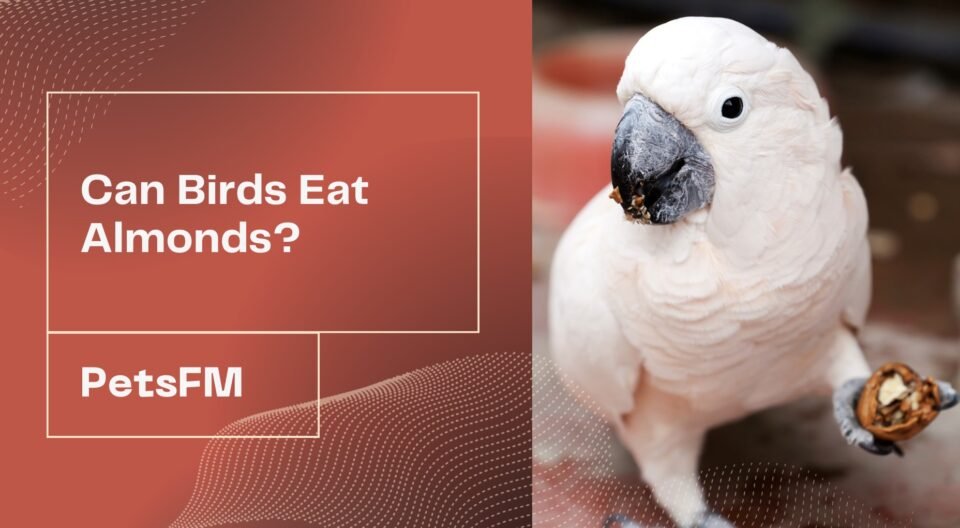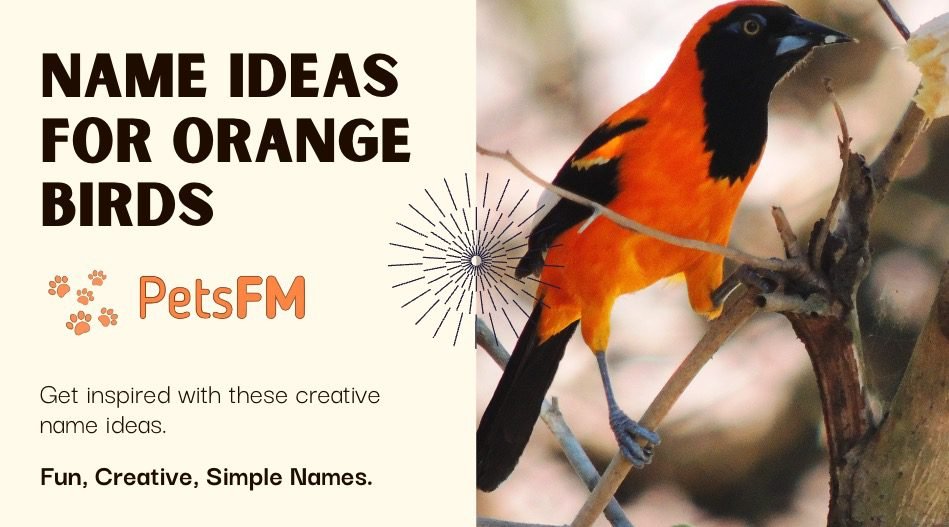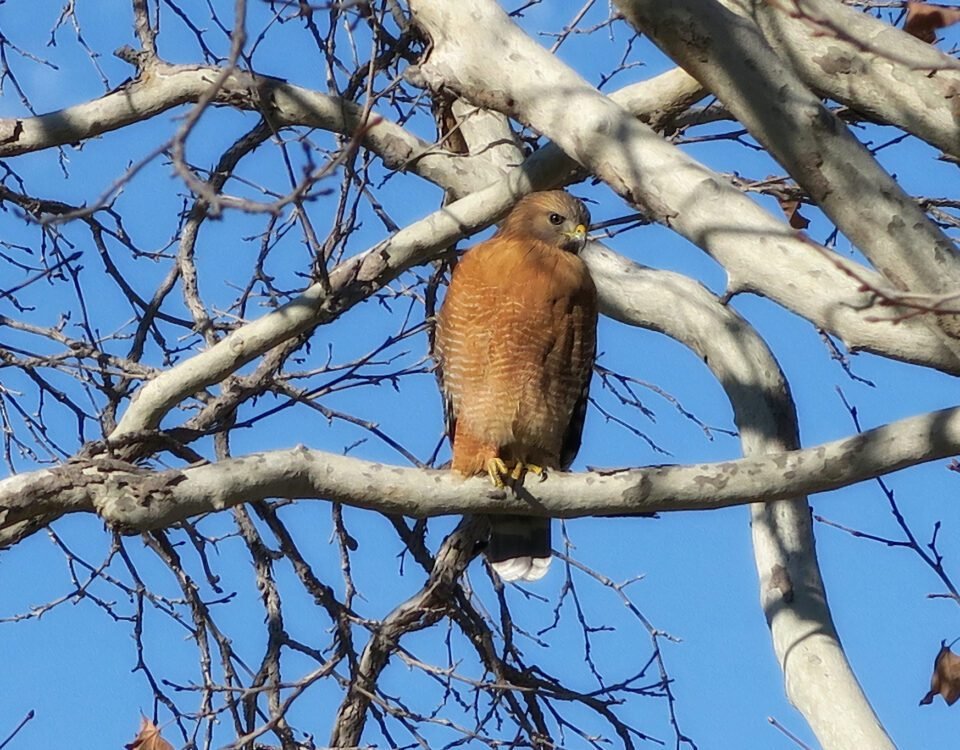


Everything You Need to Know About Birds’ Heat Cycles [2024]
January 4, 2024


Do Crows Eat Squirrels? Let’s Find Out in Detail! [2024 Updated]
January 4, 2024Bird enthusiasts often seek to enrich their feathered friends’ diets with various nutritious foods. Almonds, a staple in many households, have sparked interest among bird lovers due to their potential health benefits. But can birds eat almonds?
Almonds can be a nutritious bird treat, offering essential proteins, fats, vitamins, and minerals. However, it’s crucial to remember that almonds should complement, not replace, their natural diet. This approach ensures birds receive various nutrients while enjoying almonds as a healthy snack.
This article explores whether these nuts are a safe and beneficial addition to a bird’s diet. We will explore the nutritional value of almonds, their suitability for different bird species, and how to incorporate them into your bird’s feeding routine safely.
Understanding the role of almonds can help bird owners ensure a balanced and healthy diet for their avian companions.
Are Almonds Safe for Birds?
Almonds are generally safe for birds to eat, but some important considerations must be remembered. The almonds should be unsalted and unseasoned, as added flavors and salt can harm birds. It’s also better to offer them in moderation as part of a balanced diet.
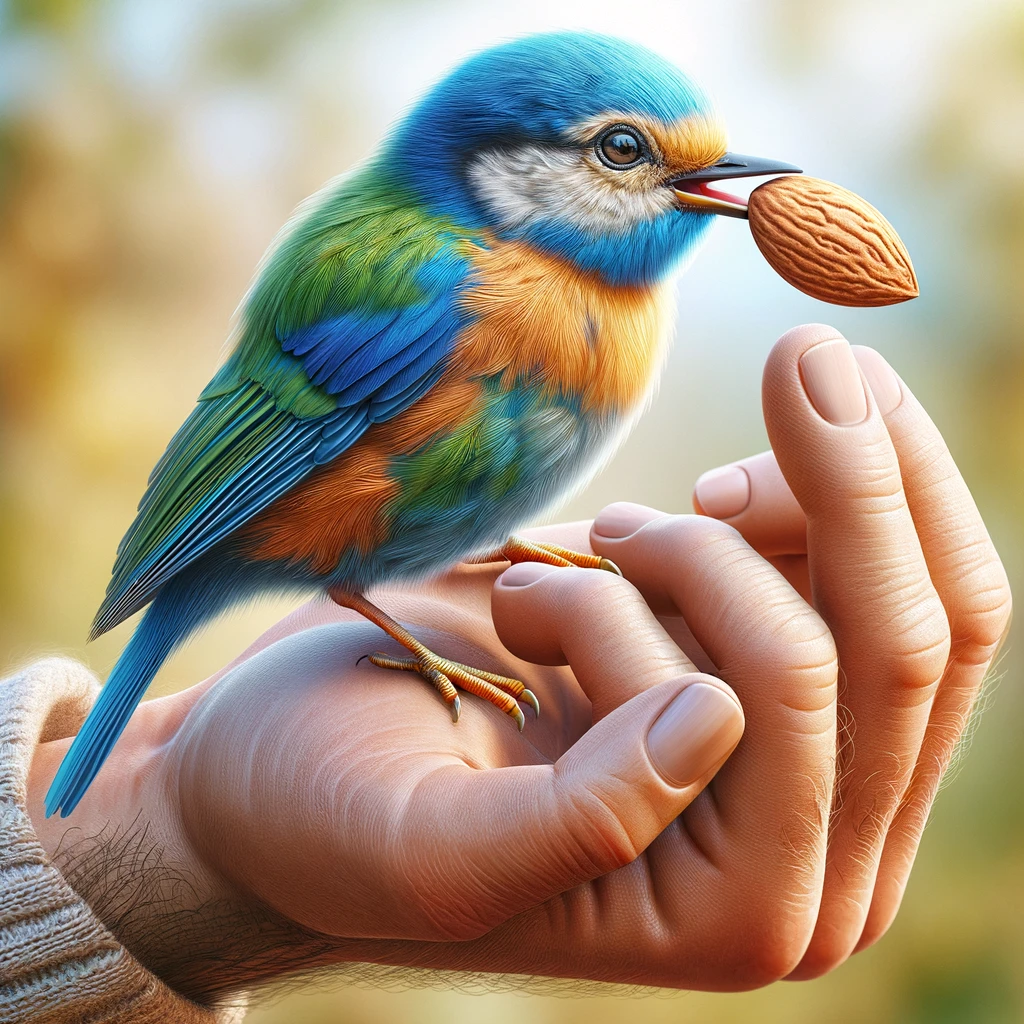

Bird Eating An Almond
Almonds in their raw or roasted form can be nutritious, offering proteins, fats, and other beneficial nutrients. However, it’s crucial to avoid bitter almonds, which contain harmful substances for birds.
Always ensure that almonds are a supplement to the bird’s natural diet, not a replacement.
Also, Read: Can Birds Eat Walnuts? Dietary Guidelines and Tips
What Nutrients Do Almonds Offer to Birds?
Almonds offer a range of nutrients beneficial to birds.
- They are a rich source of protein, essential for muscle development and maintenance.
- Almonds also contain healthy fats, which are vital for energy and overall health.
- They provide essential vitamins and minerals, including vitamin E, magnesium, and calcium, which support various bodily functions in birds.
However, offering almonds in moderation is essential as part of a balanced diet, considering their high-fat content. These nutrients make almonds a nutritious bird snack, enhancing their diet when appropriately given.
Also, Read: Can Birds Eat Dates? (Which Species + How To Feed)
Can All Birds Eat Almonds?
Almonds can be a healthy treat for many birds, but suitability varies among species. Larger birds, like parrots, can easily consume whole almonds, while smaller birds may require chopping.
It’s essential to ensure almonds are unsalted and unflavored for safety.
Birds with specific dietary needs might not find almonds as beneficial. As with any treat, almonds should be given in moderation and as part of a balanced diet.
How Should Almonds Be Prepared for Birds?
When preparing almonds for birds, follow these guidelines:
- Choose Raw and Unsalted: Opt for raw, unsalted almonds, as salt and seasonings can harm birds.
- Size Appropriation: For smaller birds, chop or crush the almonds to make them easier to eat.
- Avoid Bitter Almonds: They contain substances that can be toxic to birds.
- Limit Quantity: Offer almonds in moderation, ensuring they are only a tiny part of the bird’s diet.
- No Chocolate or Sugar: Never give birds almonds coated in chocolate or sugar.
Can Birds Eat Roasted Almonds?
Yes, birds can eat roasted almonds, unsalted and unseasoned. Roasting almonds doesn’t significantly alter their nutritional content, making them a safe option for birds.
However, it’s vital to ensure that any roasted almonds given to birds are free from added salts, spices, or other flavorings that could be harmful to them. As with any treat, roasted almonds should be fed in moderation and as part of a varied diet.
Can Birds Eat Almond Butter?
Birds can potentially eat almond butter, but it should be given with caution. The almond butter must be natural and free from added salt, sugar, or artificial preservatives, as these additives can harm birds.
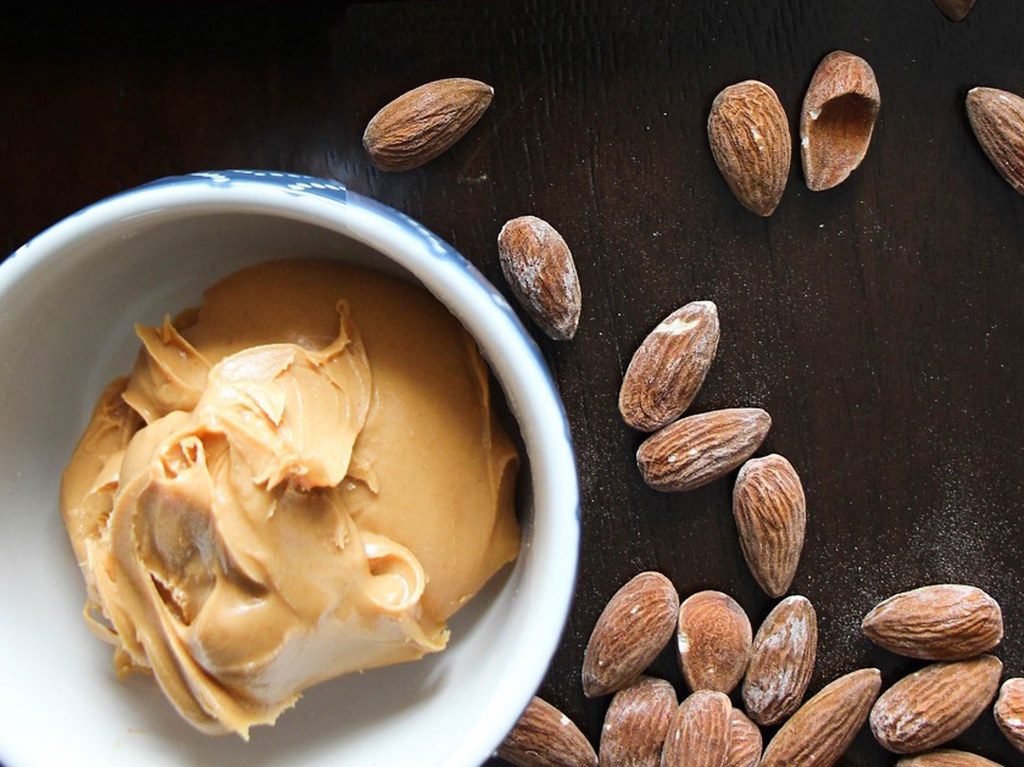

Organic Almond Butter
Also, due to its sticky consistency, almond butter should be offered in tiny amounts to prevent it from sticking to the bird’s beak or feathers. It’s important to treat almond butter as an occasional treat rather than a regular part of their diet.
Recommended Reading: What Not To Feed Wild Birds? A-Z Complete Guide
Can Birds Eat Salted Almonds?
No, birds should not eat salted almonds. The high salt content in salted almonds can harm birds, potentially leading to dehydration, kidney damage, and other health issues.
Providing birds with unsalted, natural foods is essential to ensure their health and well-being. Salted foods, in general, are not suitable for birds.
Can Birds Eat Raw Almonds?
Yes, birds can eat raw almonds. Raw almonds are a safe and healthy option for birds, offering beneficial nutrients like proteins, healthy fats, and vitamins.
However, they should be given in moderation as part of a balanced diet. It’s vital to ensure the almonds are unsalted and unseasoned. Bitter almonds should be avoided as they contain substances that can harm birds.
Must Read: Can Birds Eat Cat Food? A Comprehensive Guide
Are There Any Risks Associated with Feeding Almonds to Birds?
Feeding almonds to birds carries some risks if not managed correctly. The primary concerns are:
- Salt Content: Salted almonds can lead to dehydration and kidney issues.
- Fat Content: High fat content, if not balanced with other foods, could lead to health problems.
- Choking Hazard: Large almonds might pose a choking risk for smaller birds.
- Bitter Almonds: These contain harmful substances and should be avoided.
How Often Can Birds Be Fed Almonds?
Almonds should be offered to birds only as an occasional treat, not as a diet staple. Due to their high-fat content, limiting almond feeding to a few times a week at most is advisable.
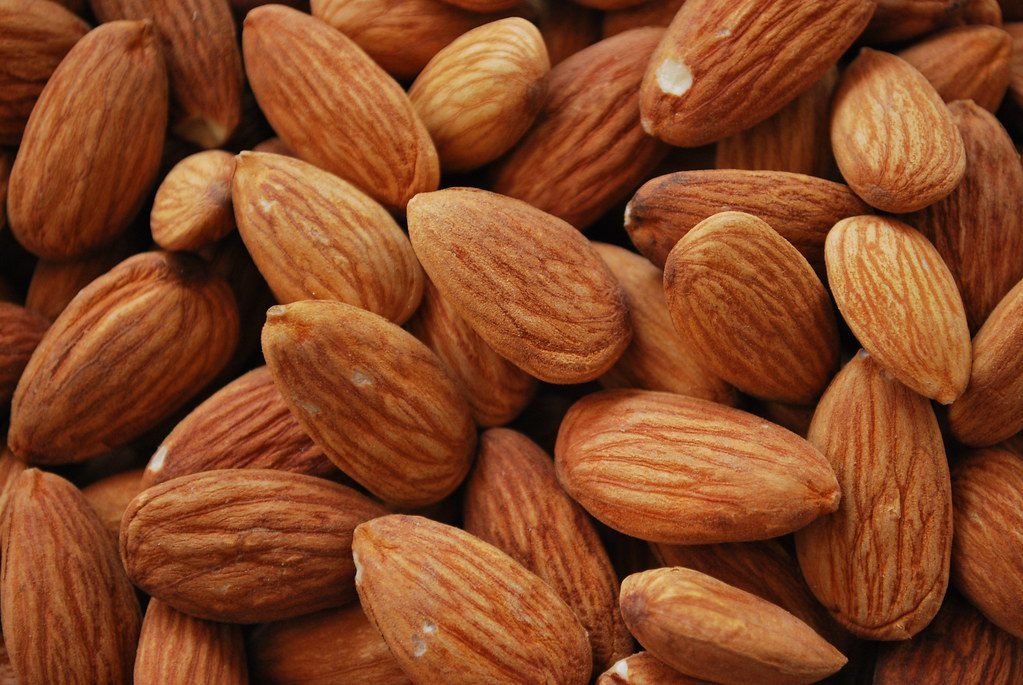

Almonds
This frequency ensures that birds receive a balanced diet without the risk of nutritional imbalances or weight gain. Always consider the size and species of the bird when determining portion sizes.
Editor’s Pick: Are Birds Omnivores? A Look at Different Species
What Other Foods Can Be Paired with Almonds for Birds?
To complement almonds in a bird’s diet, consider pairing them with a variety of other bird-friendly foods:
- Fresh Fruits: Such as apple slices, berries, or melon pieces.
- Vegetables: Like carrots, broccoli, or sweet peas.
- Other Nuts and Seeds: Chia seeds, pecans, or walnuts (unsalted and unshelled).
- Cooked Legumes: Beans or lentils, cooled and unsalted.
These foods provide a range of nutrients and textures, ensuring a balanced and enriching diet for the birds.
What Other Nuts Can Be Given To Birds?
Birds can enjoy various nuts as part of a balanced diet. Safe options include:
- Walnuts: Rich in omega-3 fats.
- Pecans: Good source of antioxidants.
- Hazelnuts: Contain healthy fats and vitamins.
- Pistachios: Unsalted, they offer protein and fiber.
- Peanuts: Ensure they’re unsalted and not flavored.
- Cashews: Unsweetened and unsalted, they are a good snack.
- Brazil Nuts: High in selenium but should be given sparingly due to high-fat content.
How To Feed Almonds To Birds?
To give almonds to birds, follow these steps:
- Choose the Right Type: Use unsalted, unseasoned, and untreated almonds. Avoid bitter almonds.
- Prepare Appropriately: For smaller birds, chop or crush the almonds. Larger birds can handle whole almonds.
- Serve in Moderation: Offer almonds as a treat, not a main part of their diet.
- Mix with Other Foods: Combine almonds with other bird-safe foods like fruits and vegetables for a varied diet.
Read Next: 15 Human Foods That Birds Can Eat [Latest Guide 2024]
Conclusion
In conclusion, almonds can be a nutritious addition to a bird’s diet, offering proteins, fats, and essential nutrients. However, they should be unsalted, unseasoned, and fed in moderation.
Different bird species may require different almond preparations. Incorporating almonds with other bird-safe foods ensures our feathered friends a balanced and healthy diet.
